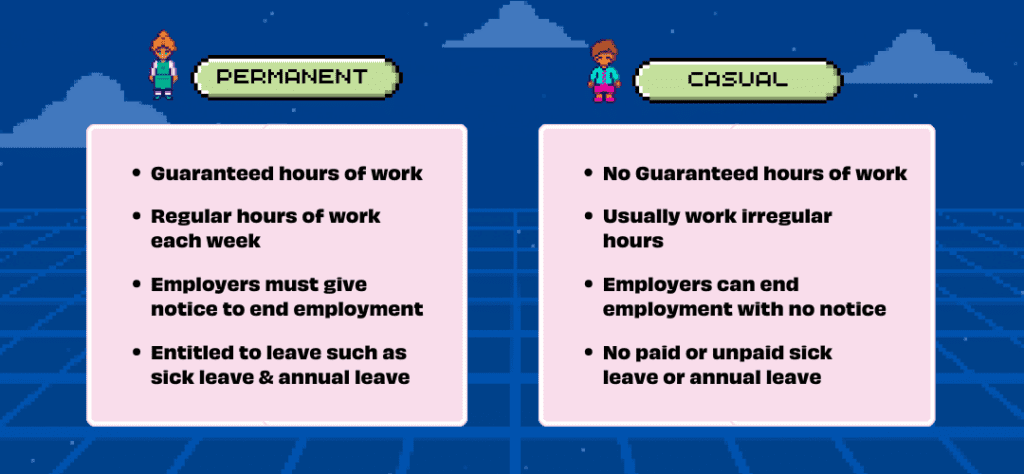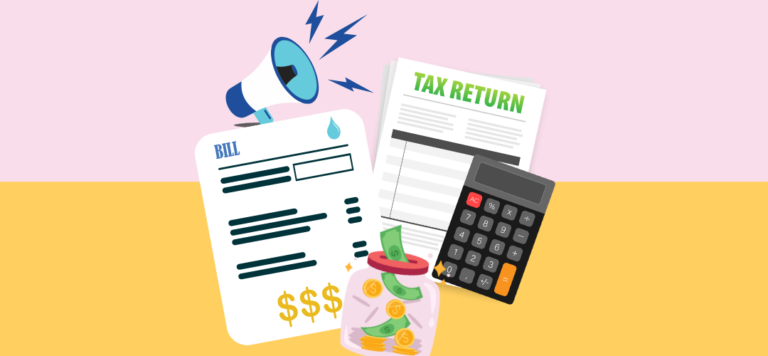Has your boss ever treated you like a permanent employee but keeps you on as a casual? Have you ever worked sick because you don’t get any paid sick leave? Ever suddenly had your shifts cut after working the same days and hours for months?
If you’re a casual, these problems are probably pretty relatable. When you’re too unwell to work – or just want to take some time off – you have to weigh it against having no income.
How will I pay for meds or even a GP appointment? Why should I have to choose between paying the rent and having a break? What if my boss doesn’t give me any more shifts?
The so-called ‘flexibility’ that casual work provides is a bit of a lie. In fact, it’s a loophole that employers have been using for too long.
Here’s why.
What’s the actual difference between casual and permanent work?
Casual work might have a higher hourly rate (often up to 25% more) and seem more flexible, but here’s the trade-off for those ‘perks’, and why employers prefer casuals.
Permanent workers can be part-time or full-time, but what they both have – that casuals don’t – is paid sick leave, paid annual leave and secure hours. It means that if you need or want to take some time off work, it won’t be a drama.
It also means that, during a cost-of-living crisis, you can have a reliable income to plan for bills, rent (and maybe even food if you’ve got anything leftover).
The reason bosses prefer casuals is because they can hire and fire without questions being asked, they don’t have to guarantee any hours, and they don’t have to pay you when you can’t work.
Problem is, workers have rights. Employers are using casual employment as a loophole to take away important rights that unions fought for.
Instead of offering these rights, casuals are entitled to a higher hourly rate that’s supposed to cover you for when you’re not working (a right that unions also won). But, the data says on average casuals earn $11.90 less per hour than permanent employees.
In theory, casuals can also pick and choose when they want to work, but we all know, if you turn down too many shifts, it feels like you might disappear off the roster.

What are the new laws? What’s changing?
New laws, known as Closing Loopholes, came into effect in February 2024. They mean that, if you’re a casual but you’ve been working for at least 6 months on regular shifts (basically as a permanent), you can ask your boss for a permanent job. If you work for a small business, it kicks in after 12 months.
You’ll have to give up the extra loading you get as a casual, but in return, you’ll get paid leave (when you’re sick or on holidays) and job security.
But I like the flexibility of casual work and the extra loading I get
If you’re a student and you just want to work weekends, then casual might be great for you. Many workers say they prefer being casual because they can work when they want to, get more pay when they do work, and have less responsibility towards their job and employer.
That’s fair, as long as you know what you’re giving up.
New laws make it easier for casuals to become permanent, but nobody’s being forced into it. You – not your boss – get to choose the conditions you want that suit you and your life situation.
Unfortunately, the cost-of-living crisis is hitting young people the hardest. Being permanent offers secure work at a time when we’re all struggling to get by. It means you might be able to plan for that massive bill instead of having to get into more debt. It means you might even get a break to recharge.
Whatever you choose to do, know your rights.





